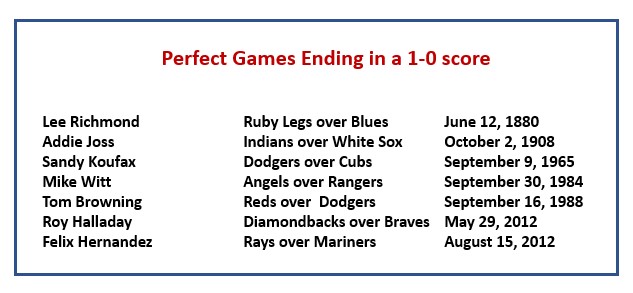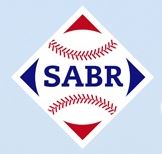
Walter Johnson. Photo by pingnews.com 
It’s the dreaded baseball off-season and, as usual, Baseball Roundtable is drawn to random musings driven by the baseball record book. And – also as usual – as I approached this task, one thing led to another. In this case, a look at Hall of Famer Walter Johnson’s record in 1-0 games, led to a foray into unique 1-0 contests in MLB history.
Let’s start with Johnson, in his 21 MLB seasons, The Big Train took the mound in 65 1-0 contests – putting up a 38-26 (with one no-decision) record. His 65 appearances included 62 starts and three relief appearances and – an illustration of how times have changed – Johnson threw complete games in 60 of those 62 starts.
By comparison, in 24 seasons, Roger Clemens took the mound in 21 games that ended in a 1-1 score, going 8-5, with eight no-decisions. He started all 21 games and completed four. In 2005, Roger Clemens started for the Astros in five games that ended in a 1-0 score. The Astros lost all five, with Clemens getting five no-decisions. In those five no-decisions, Clemens pitched 35 innings, giving up 15 hits and no runs, while walking eight and fanning 37. In the 2005 season, the Astros were shutout in nine of Clemens’ 32 starts. I warned you that “one thing leads to another.”
NOTE: THERE IS STILL TIME TO VOTE IN BASEBALL ROUNDTABLE’S FAN 2023 HALL OF FAME BALLOTING. CLICK HERE TO GO TO THE POST THAT HAS A LINK TO THE BALLOT.
Now, lets look at some notable 1-0 tilts, starting with one by the layer who spurred this post. I should add hat I have ranked these games subjectively, in terms of their interest to me – as opposed to their objective significance.
Number One – Probably Never See This Again
Hall of Famer Walter Johnson is one of four players to share the record for the longest complete-game shutout in MLB history. Three of the four ended in 1-0 scores. Johnson shutdown the Chicago White Sox 1-0 over 18 innings on May 15, 1918. Johnson gave up ten bits and one walk, while fanning nine. His mound opponent, Lefty Williams, also went the distance, gave up just eight hits, with two walks and three strikeouts. Johnson – a good-hitting pitcher – played a role in the 18th inning score. Senators’ catcher Eddie Ainsmith rapped a one-out single, with Johnson singling him to third and Ainsmith scoring on a wild pitch. In this age of pitch counts and relief specialists, we’re not likely to see another 18-inning complete game.
The other complete-game, 18-inning 1-0 winners:
- The Providence Grays’ John Montgomery Ward shut out the Detroit Wolverines 1-0 over 18 innings on August 17, 1882. Ward started is career as a pitcher/outfielder (leading the league in wins with 47 in 1878 and tossing a perfect game that season). An arm injury resulted in his switching to a full-time infielder after seven MLB seasons. Montgomery earned a Law Degree in the off-seasons and set up the first-ever players union in 1885.
Walk-Off Winner
John Ward’s 18 inning 1-0 win is reportedly the first 1-0 game won by a walk-off home run, The dinger was hit by Hall of Fame pitcher Charles “Old Hoss” Radbourn, who was playing outfield that day.
- The Giants’ Carl Hubbell whitewashed the Cardinals 1-0 over 18 innings on July 2, 1933.
The other pitcher to toss 18 shutout innings in a game was the Tigers’ Ed Summers, who on July 16, 1909, held the Washington Senators to no runs on seven hits (two walks ten strikeouts) over 18 innings in a contest that ended in a 0-0 tie. (Two Senators’ hurlers gave up just six hits, with seven walks and seven whiffs.) Summers pitched in five MLB season, going 68-45, 2.42. (He was 24-12, 1.64 as a rookie in 1908.) His career was cut short by arm issues.
Walter Johnson Tidbit
Walter Johnson’s MLB-record 110 complete-game shutouts and record (tied) for leading the league in shutouts (seven seasons) provide ample evidence that he is the “King of the Whitewashing.” On Labor Weekend 1908 – in just his second MLB season – the 20-year-old future Hall of Famer gave notice of what lie ahead.
Johnson’s Senators were in New York for a weekend series against the Highlanders (Yankees). Johnson started on Friday, September 4 and threw a six-hit, complete-game shutout. He came back on Saturday the fifth and was even better, tossing a four-hit shutout. Sunday, fortunately for Johnson’s arm, was an off day (no Sunday baseball). On Monday, Johnson was back on the mound and he was even better, this time tossing a two-hit shutout. So, in four days, he threw three complete-game shutouts, pitching 27 innings, giving up just 12 hits (one walk, 12 strikeouts). No probably here – we will never see that again.
Number Two – 1-0 … Almost 3-0 … Almost Perfect
Subtitle – The Unlucky 13th
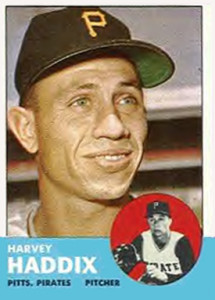 On May 26, 1959, Pirates’ southpaw Harvey Haddix took the mound against the power-laden Milwaukee Braves (who had won the National League pennant the previous two seasons and came into the game again leading the league). Haddix retired the first 36 hitters in order – fanning eight over 12 perfect innings. A 20-game winner in 1953, the 33-year-old Haddix had come into the game 4-2, with a 2.67 ERA in seven starts – and had thrown complete games in his two previous outings. (He would end up 12-12, 3.13 on the year.)
On May 26, 1959, Pirates’ southpaw Harvey Haddix took the mound against the power-laden Milwaukee Braves (who had won the National League pennant the previous two seasons and came into the game again leading the league). Haddix retired the first 36 hitters in order – fanning eight over 12 perfect innings. A 20-game winner in 1953, the 33-year-old Haddix had come into the game 4-2, with a 2.67 ERA in seven starts – and had thrown complete games in his two previous outings. (He would end up 12-12, 3.13 on the year.)
Unfortunately, the Braves’ Lew Burdette, despite giving up 12 hits and fanning only two, had held the Pirates scoreless. (Like Haddix, Burdette had not issued a single free pass.) Milwaukee 2B Felix Mantilla led off the 13th by reaching on error by Pirates’ third baseman Don Hoak. Slugging 3B Eddie Mathews bunted Mantilla over to second, which led to an intentional walk to RF Hank Aaron, bringing up 1B Joe Adcock. Adcock rapped a 1-0 pitch over the right field fence for what appeared to be a three-run home run. However, the Braves, in celebrating the tension-filled victory, forgot how to run the bases. Adcock passed Aaron between second and third and, after some deliberation, Adcock was called out – ultimately changing his three-run homer to a one-run double. So, despite 12 perfect innings, Haddix lost the no-hitter, the shutout and the game itself. But he did etch his name forever into baseball lore; and countless trivia quizzes – and made this one memorable 1-0 ball game. This game got extra points in my subjective ratings because, as an 11-year-old Braves fan at the time, I was listening to the game on the radio.
Haddix spent 14 seasons (1952-65) in the major leagues (Cardinals, Phillies, Reds, Pirates, Orioles), going 136-113, 3.48. His best seasons were with the Cardinals in 1953-54. In those two campaigns, Haddix put up lines of 20-9, 3.06 and 18-13, 3.57. The 5’9”, 170-pounder was a three-time All Star and led the NL in shutouts (six) in 1953.
Harvey Haddix Tidbit
Harvey Haddix 12 perfect innings on May 26, 1959, were particularly improbable. One, Haddix was suffering from the flu that day. Two, it was later reported that the Braves were stealing the signs laid down by Pirates; catcher Smoky Burgess (and they still couldn’t hit him.)
Number Three – One Game … Two pitchers … One Hit … 1-0
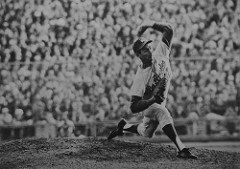
Photo by cliff1066™ 
When Dodgers’ icon Sandy Koufax tossed a perfect game on September 9, 1965, he pretty much needed it. He was opposed by Cubs’ right-hander Bob Hendley (who went 48-52, 3.97 in a seven-year MLB career), who was on top of his game as well. After eight innings, Hendley had given up just one hit and one walk (versus three strikeouts). The only hit had been a harmless double by Dodgers’ LF Lou Johnson in the bottom of the seventh. Hendley had allowed just one run in eight frames – and even that wasn’t his fault. The pesky Johnson had led off the fifth with a walk; moved to second on a sacrifice by RF Ron Fairly; stole third; and scored as Cubs’ C Chris Krug made a wild throw past third baseman Ron Santo.
Hendley’s efforts, however, weren’t nearly enough that day. Koufax, who came into the game already a 20-game winner (21-7 on the season), threw a perfect game – striking out 14 Cubs. A high-rating here, for the perfect game and the fewest combined hits ever allowed in an M LB game.
Number Four – A Hard Day’s Night
On April 15, 1968, the Astros and Mets started a 1-0 contest that did not end until 1:37 a.m. April 26. It tied for the fourth-longest game in MLB history – and the 24 innings represent the single-game record for the longest any game remained scoreless. Points were given here for the length of game and how each team’s offensive futility mirrored the other. A few tidbits:
- Each team collected eleven hits in 79 at bats during the game (won by the Astros with one out in the ninth) – a combined batting average for the game of .139.
- Mets’ pitchers faced 87 batters; the Astros 88.
- Each team had ten singles and one double;
- Each team left 16 men on base.
- Each team made one error.
- Each team threw two wild pitches.
- Each team turned one double play.
- Each team used four pinch hitters
- The two starting pitchers, Tom Seaver and Don Wilson, came in with ERAs of 3.24 and 3.00, respectively – and left with ERAs of 1.47 and 1.50, throwing ten and nine scoreless innings, respectively.
A few other overall facts:
- A total of 39 players appeared.
- 27 of the 48 half-innings were 1-2-3 frames.
- There were 35 strikeouts in the game.
- The Mets’ CF Tommie Agee and RF Ron Swoboda each went zero-for-ten in the game.
- The game took six hours and six minutes.
- The winning run scored on a groundball error.
Game Tidbit
After 23 1/2 scoreless frames, the deciding bottom of the 24th went like this: With Les Rohr on the mound for the Mets, Astros’ RF Norm Miller (at the time 0-for-seven) singled to right; Rohr balked him to second; LF Jim Wynn was intentionally walked; Rusty Staub grounded out second-to-first, with the runners moving up to second and third base; PH John Bateman was intentionally walked; 3B Bob Aspromonte (at the time 0-for-8) reached on an error by Mets’ SS Al Weiss, with Miller scoring the game’s lone run.
Number Five – 61 in ‘61
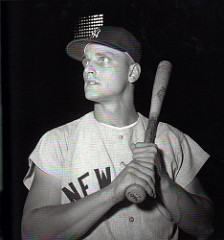
Photo by rchdj10 
One of my favorite trivia questions has always been: What was the score of the game in which Roger Maris hit his then record-breaking 61st homer? Since this post is about 1-0 games, you can be sure that was the score. On October 1, 1961 – in the Yankees’ final game of the regular season – Roger Maris hit his 61st home run of the season. The shot came off Tracy Stallard with one out in the bottom of the fourth inning. Breaking an iconic record, on the final day of the season, in a tight 1-0 game, versus the arch-rival Red Sox earns this spot in the Roundtable rankings
Roger Maris Tidbit
1961, the year Roger Maris hit 61 home runs, was the only season in his 12-year MLB career that he did not draw a single intentional walk.
Number Six – A Double No-No … Well, Almost
On May 2, 1917 the Reds faced the Cubs in Chicago, with righty Fred Toney starting for the Reds and southpaw Jim “Hippo” Vaughn on the bump for the Cubs. Toney, who would win 24 games that season, came in with a 4-1, 1.88 record and five complete games in five starts. Vaughn, on his way to a 23-win season, stood at 4-2. 2.25, with three complete games in four starts. The expected pitching duel materialized.
After nine innings, the game was knotted at 0-0 and neither Toney nor Vaughn had surrendered a hit (the only MLB game ever in which both pitchers held the opposition hitless for nine frames). Vaughn seemed to be getting the better of it. Each pitcher had walked just two batters, but Vaughn had fanned ten to Toney’s one. In the top of the tenth, Vaughn faltered and a pair of singles and an outfield error led to an unearned run. Toney pitched a 1-2-3 bottom of the inning (strikeout-fly out-strikeout) to leave the mound with a 1-0 no-hitter win.
Toney pitched 12 MLB seasons (1911-13, 1915-23), going 139-102, 2.69 and twice won 20 or more games. Vaughn pitched in 13 MLB seasons (1908, 1910-21), going 178-137, 2.49 – and won twenty or more games in five seasons. In 1918. Vaughn won the pitching Triple Crown, leading the NL in wins (22), ERA (1.74) and strikeouts (148).
Hippo Vaughn Tidbit
The last two MLB hitters Hippo Vaughn faced (Giants’ C Frank Snyder and the opposing pitcher Paul Douglas) both homered against him (a Grand Slam and a solo shot) with one out in the fourth inning of a Giants’ 6-5 win over Vaughn and the Cubs on July 9, 1921. Vaughn was pulled from the game and reportedly left the club – never to play in the major leagues again. Various explanations for Vaughn’s departure (and subsequent suspension) from the major leagues have surfaced, but none have been officially confirmed. According the Vaughn’s Society for American Baseball Research biography (written by Jan Finkel) Vaughn did go on to pitch for several years in a number of semi-pro leagues. In his final M LB season, he was 3-11, 6.01.
Number Seven – Let’s Get This Party Started
On Opening Day 1940 (April 16), the Indians’ Bob Feller no-hit the White Sox 1-0 in Chicago, walking five and fanning eight. The 21-year-old Feller would go on to post a 27-11, 2.61 record that season – leading the AL in wins, ERA, starts (37), complete games (31), shutouts (4), innings pitched (320 1/3) and strikeouts (261).
Six seasons later – on Opening Day 1946 – Leon Day of the Negro National League Newark Eagles no-hit the Philadelphia Stars 2-0. The only other no-hitter recorded on MLB Opening Day. Feller’s 1-0 win remains the first Opening Day NO-NO and the only Opening Day 1-0 no-hitter – and worth of this spot on this list.
Number Eight- Another Johnson Shutout
On Opening Day 1926 (April 13), Walter Johnson went the distance in a 15-inning 1-0 win (Washington Senators over the Philadelphia Athletics). Johnson gave up just six hits and three walks, while fanning nine. His mound opponent, Eddie Rommel, was nearly as good. Going the distance and giving up just one run on nine hits (six walks/one whiff). Three of those nine safeties – and the game’s lone run – came in the bottom of the fifteenth (the longest MLB Opening Day, complete-game shutout).
Walter Johnson tidbit
Walter Johnson threw a record seven Opening Day shutouts (in 14 Opening Day starts).
Number Nine – Something Old … Something new … One Pitcher to Go Home Blue
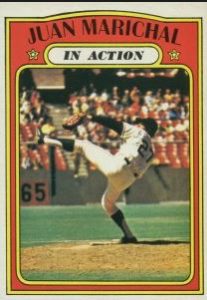 On July 2, 1963, 42-year-old southpaw Warren Spahn (already an 11-time 20-game winner) faced off in San Francisco versus the Giants’ 25-year-old righty Juan Marichal, who was on his way to his first 20+ win season. Spahn came into the game at 11-3. 3.12, coming off a June 28 complete-game shutout of the Dodgers (besting Don Drysdale by 1-0 score). Marichal was at 12-3, 2.38.
On July 2, 1963, 42-year-old southpaw Warren Spahn (already an 11-time 20-game winner) faced off in San Francisco versus the Giants’ 25-year-old righty Juan Marichal, who was on his way to his first 20+ win season. Spahn came into the game at 11-3. 3.12, coming off a June 28 complete-game shutout of the Dodgers (besting Don Drysdale by 1-0 score). Marichal was at 12-3, 2.38.
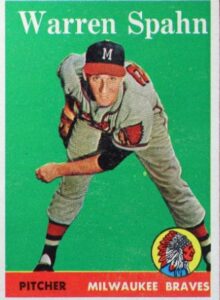 The two high-kickers went on to an epic pitching duel – both going the distances in a 1-0, 16-inning Giants’ win. The game was scoreless through 15 innings. Marichal held the Braves at bay in the top of the 16th inning and with one out in the bottom of the 16th, Willie Mays hit a walk-off home run off Spahn to end he contest.
The two high-kickers went on to an epic pitching duel – both going the distances in a 1-0, 16-inning Giants’ win. The game was scoreless through 15 innings. Marichal held the Braves at bay in the top of the 16th inning and with one out in the bottom of the 16th, Willie Mays hit a walk-off home run off Spahn to end he contest.
At the close of the game, Marichal had thrown 227 pitches, giving up just eight hits and four walks, while fanning ten. Spahn has launched 201 pitches, giving up nine hits (and that one run), while walking one and fanning two. Spahn finished the season at 23-7, 2.60, with a league-leading 22 complete games. Marichal went 25-8, 2.14 and lead the NL in wins as well as innings pitched (321 1/3).
1963 Tidbit
Neither Warren Spahn or Juan Marichal received a single vote in the Cy Young balloting, as the Dodgers’ Sandy Koufax was a unanimous choice at 25-5, with a league-low 1.88 ERA, a league-topping 306 strikeouts and a league-best 11 shutouts.
Points given here for the classic old and crafty master versus the hard-throwing youngster matchup.
Number Ten – Leave Me In, Coach
The 1991 World Series was one for the ages. It went seven games, five of which were decided by one run and three of which went extra innings. The seventh and final game was a ten-inning 1-0 affair, with Twins’ starter Jack Morris going the distance, giving up seven hits and two walks, while fanning eight. This one is here partially because I was at this tense contest – and by the fact that Morris fashioned ten scoreless innings in the winner-take-all game.
Number Eleven – Talk about Stealing a Game
As I prepared this post, I came across more than a dozen 1-0 (AL/NL) games in which the only run was a steal of home and nearly three dozen games that ended with a walk (run)-off steal of home. However, I found only one 1-0 game that ended with a walk-off steal of home. That occurred on April 28, 1906, as the Cubs, with Cubs ‘first baseman Frank Chance (of Tinkers-to Evers-to Chance fame) swiping home in the bottom of the ninth to break a 0-0 tie. Chance, by the way, didn’t have to wait for the manager’s signal to take the risk – he was, at the time, the Cubs’ first baseman, cleanup hitter and manager (in fact, he managed the Cubs to a 116-36 record that season). Chance played 17 MLB seasons (1898-1914), hitting .296-20-596, with 403 steals. He had a 768-389 record in eight seasons as a manager, winning four pennants and two World Series Championships.
Number Twelve – Another Way to Get the Party Started
There have been 28 AL/NL 1-0 games in which the only run came on a leadoff home run. Not rare enough to catch Baseball Roundtable’s eye. However, there have been only two 1-0 games (that I could document) in which that leadoff home run came on the very first pitch.
On September 2, 1963, Pete Rose was playing second and leading off as the Reds faced Mets’ righty Jay Hook in New York. Rose hit Hook’s first offering of the game for a home run to deep left – and the long ball proved to be the only run of the game. The Reds’ Jim Maloney picked up his 20th win of the season, tossing a three-hit, six-walk, 13-whiff shutout. Hook – who ended the season 4-14, 5.48, pitched one f his best games of the season – going nine-innings and giving up just the one run (four hits, one walk and five strikeouts.)
Jay Hook Tidbit
Despite his 5.00+ ERA and 4-14 record in 1963, three of Hooks’ four wins were complete games in which he gave up two or fewer runs.
On May 18, 2013 the Diamondbacks faced the Marlins (and starting pitcher Tom Koehler) in Miami. Gerardo Parra was leading off and playing RF for the Diamondbacks and he hit Koehler’s first pitch of the game for a home run to right. It proved to be the only run of the game, as Koehler and three Miami relievers allowed just one walk and three singles the rest of the way, Diamondbacks’ starter Brandon McCarthy – who came into the game 0-3, 5.63 in eight starts – was up to the challenge, holding the Marlins scoreless for a three-hit, complete -game shutout and his first win of the season. It was one of just four shutouts in McCarty’s 13-season (2005-09, 2011-18) MLB career.
A first pitch home run as the only scoring deserves recognition.
Number Thirteen – The All Star Game without an RBI
“Who had the game-winning RBI in three 1968 All Star Game? “ Answer: No One – Not a single RBI was awarded as the National League topped the American League 1-0 on July 9, 1968.
The only run in this game scored in the bottom of the first. National League CF Willie Mays singled off Luis Tiant to open the inning and went second on a botched pick-off (error on Tiant). LF Curt Flood then walked and, on a wild pitch, Mays went to third. 1B Willie McCovey then grounded into a double play, scoring Mays, but with no RBI (an unearned run). From that point on, no one scored. The game saw a total of only eight hits (three by the winning NL squad) – four doubles and four singles. The 12 pitchers walked six (all by the AL hurlers) and fanned 20 (11 by the NL moundsmen).
It was “The Year of the Pitcher,” but still you have to give a shout out to the moundsmen that held all those All Star bats at bay: Luis Tiant (who gave up the sole – unearned – run); Blue Moon Odom; Denny McLain; Sam McDowell; Mel Stottlemyre; Tommy John; Don Drysdale; Juan Marichal; Steve Carlton; Tom Seaver; Ron Reed; Jerry Koosman.
Number Fourteen – Cy-anora
On September 22, 2011, Cy Young took the mound for the Boston Rustlers (versus the Pittsburgh Pirates). The future Hall of Famer – at the age of 44 – twirled a nine-hit (no-walk, three-whiff) shutout for a 1-0 victory. It was his 511th – and final – regular-season win. Young started three more games before retiring from the big-league mound at the end of the campaign and took the loss in all three.
You have to acknowledge the great Cy Young’s final victory.
Number fifteen – Number Short, But Sweet
Don Fisher was a 29-year-old rookie right-hander – signed by the Giants (off the Cleveland sandlots) in 1945 – getting his chance to pitch in the major leagues when the rosters were depleted by World War II. He made his debut on in relief on August 25, 1945, giving up four runs in five innings of relief. A month later (September 30), on the final day of the season, he pitched in his second (and final) MLB game, starting for the Giants against the Braves in Boston. That proved to be a memorable 1-0 game, as Fisher pitched a 13-inning, ten-hit, complete-game shutout (three walks and two strikeouts). The lone run scored on a home run by Giants’ third baseman and number-eight hitter Nap Reyes. Notably, it was Fisher’s final MLB appearance and only MLB win, as well as Reyes’ final major-league hit. Reyes got only one more MLB at bat (on April 27, 1950). Reyes played in four MLB seasons (1943-45, 1950) and hit .284-13-110 in 279 games. Fisher went to Spring training with the Giants in 1946, but was sent down to the minors where he went 3-85.02 in his only other professional seasons.
Primary Resources: Baseball-Reference.com; Baseball-Almanac.com
Note: Some of he MLB records noted in this post have the potential to change as Major League Baseball recognizes and further incorporates Negro League records from 1920-48.
Baseball Roundtable – Blogging Baseball Since 2012.
 Baseball Roundtable is on the Feedspot list of the Top 100 Baseball Blogs. To see the full list, click here.
Baseball Roundtable is on the Feedspot list of the Top 100 Baseball Blogs. To see the full list, click here.
I tweet (on X) baseball @DavidBaseballRT
Follow Baseball Roundtable’s Facebook Page here. More baseball commentary; blog post notifications.
Member: Society for American Baseball Research (SABR); Negro Leagues Baseball Museum; The Baseball Reliquary.
